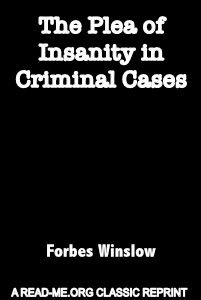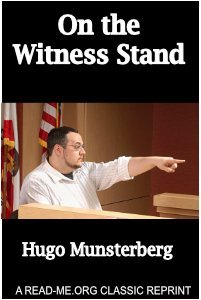By Forbes Winslow.
“This treatise was one of the first attempts to outline criteria through which to determine the legitimacy of an insanity plea. This issue would be resolved later that year with the establishment of the McNaghten Rules, which this work undoubtedly influenced, and which are still applied in England today.”
London : H. Renshaw, 1843. 78p.
By M. Ralph Brown.
Psychology Apoplied to the Trial of Cases, to Crime and Its Treatment, and To Mental States and Processes, Indianapolis: “The aim of the author has been to collect and to explain within the covers of this small volume those principles of applied psychology which are of distinct benefit to the legal profession. Usefulness to the practicing lawyer has been the criterion upon which the inclusion or exclusion of material has been based. The field of applied legal psychology is at the present time almost an uncharted one. It is true that there are some few books, and a number of articles or chapters of books, upon this subject, yet on the whole they are so general in treatment, so difficult to obtain, or developed from some other angle than that of serving the lawyer in his work, that it was felt that a volume which would avoid these defects, and which would bring the subject down to date, would not be simply another volume on an old subject, but would be a really creative achievement.”
Bobbs-Merrill, 1926. 346p.
By Hugo Munsterberg.
Essays on Psychology and Crime. “There are about fifty psychological laboratories in the United States alone. The average educated man has hitherto not noticed this. If he chances to hear of such places, he fancies that they serve for mental healing, or telepathic mysteries, or spiritistic performances. What else can a laboratory have to do with the mind? Has not the soul been for two thousand years the domain of the philosopher? What has psychology to do with electric batteries and intricate machines? Too often have I read such questions in the faces of visiting friends who came to the Harvard Psychological Laboratory in Emerson Hall and found, with surprise, twenty-seven rooms over spun with electric wires and filled with chronoscopes and kymographs and tachistoscopes and ergographs, and a mechanic busy at his work.”
New York: Doubleday, 1908. 269p.






